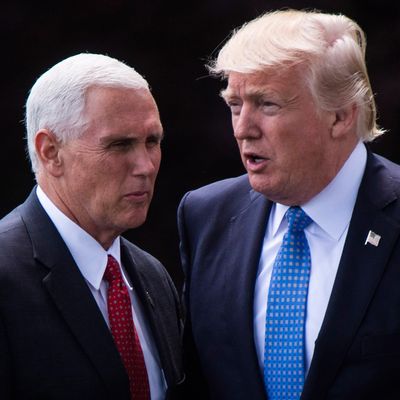
“If Trump’s poll numbers were above 50 percent,” Republican consultant Alex Conant complains to the New York Times, “health-care reform would have passed. Instead, he’s spent more time responding to cable-TV chatter than rallying support for his agenda.” That is an odd way to look at the Republican Party’s problems. While President Trump may be unpopular, he is much less unpopular than the Republican health-care plan, which a large segment of his base despises. There is nothing of appeal in the plan to sell: Since it would scale back features that people approve of, such as Medicaid expansion and protections for people with preexisting conditions, drawing more attention to its features would do more harm than good. Indeed, the complaint might have it backward — if Trump had not attached himself to a morbidly unpopular proposal, he might have higher approval ratings. But the backwardness is indicative of the desire of nervous Republican Party regulars to shift the blame for their party’s emerging failure away from those who formulated it and onto the president.
There are now clear signs that Republican regulars, who reluctantly accepted Trump and hoped to make the best of it, have cast their eyes on the exit signs already. It can be seen in Congress, where both houses passed a Russia sanctions bill against the president’s will and apparently without his knowledge, and where one member of Congress in a meeting of House Republicans recently “shocked the room” by calling the president unhelpful. (The shock is that he said in a large group setting something Republicans had previously whispered in confidence.)
And it can be seen in the conservative elite, which is seizing upon disarray within the administration as a sign that the president has betrayed the conservative agenda, or perhaps soon will. “By firing [Reince Priebus], Trump has severed a critical connection to his own party,” writes Tim Alberta. “The fear now, among Republicans in his administration and on Capitol Hill, is that Trump will turn against the party, waging rhetorical warfare against a straw-man GOP whom he blames for the legislative failures and swamp-stained inertia that has bedeviled his young presidency.” Commentary editor John Podhoretz calls the health-care debacle “the necessary end result of seven months in which the president of the United States ate up all the oxygen in Washington with his ugly, petty, seething, resentful rages and foolishnesses as expressed in 140 illiterate characters.”
For all the scandal and dysfunction surrounding Trump, it played little role in the failure to repeal Obamacare. The effort foundered on its own contradictions. Republicans had promised both to repeal the hated law and to replace it with something that gave everybody better coverage for less cost, and without raising taxes. Republicans never have and never could devise a plan fulfilling these conditions. Yes, a normal Republican president might have sold the plan more effectively. On the other hand, a normal Republican president might also have had some policy objectives, which would have constrained the menu of options available to Congress. Trump was and is willing to sign anything. Congress simply cannot pass anything.
The broader notion that Trump has broken away from party dogma likewise suffers from a total absence of supporting facts. It is true that many of the president’s confidantes have little roots in Republican politics. “Of Trump’s closest advisers, only Mike Pence has any association with the Republican Party,” writes Alberta. But that exception is an important one, because Mike Pence has enjoyed almost total control of the agenda. “Policy issues will largely fall under Vice-President Pence’s portfolio,” reports the Washington Post.
“Policy” is a pretty big portfolio. And so while unconservative figures like Ivanka Trump may be in charge of leaking self-flattering details, and Anthony Scaramucci may be tasked with rooting out all the non-Ivanka leakers, and Jared Kushner may have the Middle East–peace/government-makeover/try-to-stay-out-of-prison portfolio, Trump’s positions fall into the hands of a die-hard conservative.
On every question where Trump has had to make a choice, he has bent not only toward party orthodoxy, but toward the most militant faction within the party. Steve Bannon has for months floated the possibility of a small tax hike on the rich, which would indeed be a political masterstroke. But Bannon’s idea has gone nowhere. Other Trump staffers have shot it down. Even Trump himself denied reports he might raise the top income-tax rate. “That was not right. That was not a correct statement,” he told the Wall Street Journal.
Rather than concede defeat on Obamacare, as many Republicans quietly prefer, he has intensified his wild vindictive sabotage campaign. Trump did not remain in the Paris climate accords, but instead has outsourced environmental policy to an oil-industry cutout who picks fights with climate scientists. He has sided with the House Freedom Caucus on transgender soldiers, and even, astonishingly, on the threats of a shutdown or a debt default. Trump may not have a coherent ideology, but this is because he’s a simpleton, and his instinctive need for dominance is routinely manipulated toward the end of maximal partisan confrontation.
Trump has stuck to his campaign promises to give law enforcement a free hand. He has abandoned the promise to build a trillion dollars in new infrastructure. It is hard to think of a single substantive choice he has made that would have differed from one made by a President Ted Cruz. The Republican Party may be preparing to abandon Trump. Curiously, Trump has shown no sign of abandoning them.






























